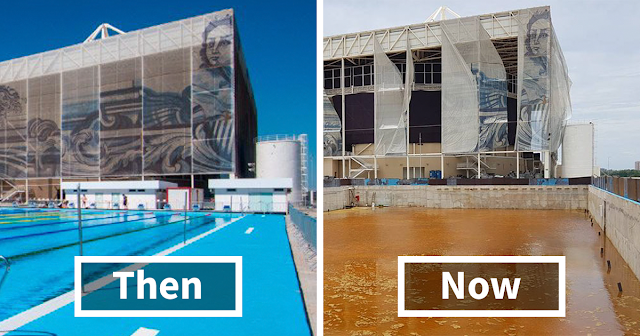Flaming Out: On that post-Brazil
Olympics report
by rick olivares
There is a report on ESPN’s
website about Rio de Janeiro post-2016 Olympics that was published last August
10. Written and reported by Wayne Drehs and Mariana Lajolo, the story titled
“After the Flame” depicts the failure of the Games (as well as the World Cup
that preceded it) to lift Brazil into new heights. This isn’t the only report
on post-Olympics Brazil. There are lots. Google them.
Sure there are lasting memories
of Michael Phelps, Usain Bolt, the fantastic opening program, and many other
highlights from the Games. But they don’t begin to tell the whole story. As the
report sums up, “What’s left behind? A city shrouded by corruption, debt, and
broken promises.”
In many ways, the International
Olympic Committee should also be blamed for this. The Rio Games to begin with
had all sorts of problems all the way to the Games themselves. And in
hindsight, it was an expensive event with the gains very much short-term.
The Athletes Villages that were
supposed to be converted into private condominiums are empty. Competition
centers have been vandalized, are in a state of disarray, and are littered with
trash and rodent feces. Even the Maracaña Stadium has been the victim of
thieves since it was shut down due to an unpaid US $9500,000 bill!
Were the Rio Games nothing more
than a white elephant?
It is sad in every which way for
such a proud, talented, and bountiful country.
In the aftermath of the Rio Games
where the organizing committee asked the International Olympic Committee for
financial aid, the IOC said “no”.
When you look at many of the
world’s governing sports bodies, it’s the same story – awarding international
events to countries ill-equipped to stage something of this magnitude. Why were
they awarded in the first place? In the spirit of developing sports? For votes
for positions of power? For vast sums of money? All of the above?
These sports bodies must also be
made culpable for their actions and decisions. I am certainly glad that FIFA
officials were arrested for their corruption. Law enforcement agencies and
governments should also look at the IOC and other sports bodies for their hand
in these events. For too long have they operated with impunity. They have this
stipulation that when there is government intervention in a sports federation’s
affairs, they will be suspended.
I am not suggesting that the IOC
is to blame for Brazil’s woes post-Olympics. That falls on the local organizing
committee. But what in the reports did not say all this was bound to happen?
All one had to do was monitor
everything that was going on with the 2014 World Cup in Brazil that was a
disaster of titanic proportions on and off the pitch. Whatever promises were
made for development post-World Cup never materialized.
I recall former FIFA President
Sepp Blatter wondering – and this is on record – if world football’s governing
body should revisit its awarding policies. Damn right they should.
Rio isn’t the first city to
experience massive problems post-Olympics. For years the Olympics were a losing
proposition. That is until the 1984 Los Angeles Games – the most financially
successful and perhaps best-organized games of the modern era.
Most Olympic Games have their
share of problems big and small. It will happen. But the Games should be looked
at as a whole. Can this city mount it? If China won the right to host the 2019
FIBA World Cup because of its merits – they have the current infrastructure to
mount the games, better transportation system, and others? Why can’t others get
it right?
After the problems of Rio, there
is concern about Qatar hosting the FIFA World Cup. Why was it awarded to that
country in the first place? Votes? Money? A seat on the Executive Board? Or a
sincere desire to grow the game?
If people are sincere then
decisions for hosting rights must be sensible, rational, and based on fact and
track record. Potential is just that… potential. Promises are just that
promises.
Just ask the people and the
athletes of Brazil.










No comments:
Post a Comment